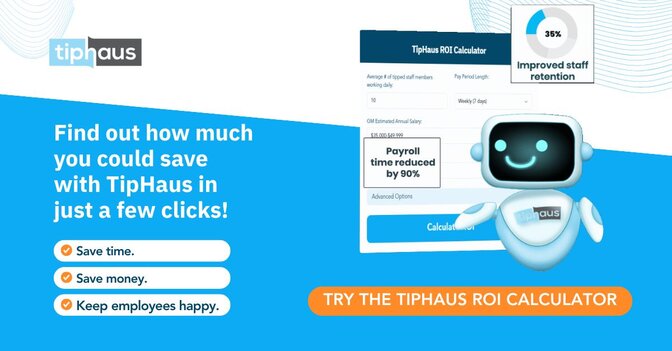
Please note: We are not a legal firm and do not provide legal advice. This article is for informational purposes only. Consult with a qualified attorney before implementing any practices discussed herein.
Tipping is a cornerstone of the hospitality industry in Colorado, but compliance requires navigating minimum wage rules, tip credits, service charges, and employee protections. Employers who fail to follow the law risk penalties, while employees benefit from clear protections.
This guide covers:
Effective January 1, 2026, Colorado’s state minimum wage has increased to $15.16 per hour. For tipped employees, the minimum cash wage is $12.14 per hour, with employers permitted to claim a tip credit of up to $3.02 per hour, ensuring total earnings meet or exceed the standard minimum wage. If an employee's tips do not bring their total earnings to $15.16 per hour, the employer must compensate for the shortfall.

Tip pooling is permitted in Colorado, but it must be carefully managed to remain compliant with state and federal laws. Only employees who regularly receive tips, such as servers and bartenders, may be required to participate in a tip pool. Managers, supervisors, and back-of-house staff like cooks and dishwashers are prohibited from participating. Employers cannot claim a tip credit if a mandatory tip pool is implemented, meaning they must pay all employees the full cash wage of $15.16 per hour. Transparency and fairness are critical in tip pooling arrangements, and violations can result in significant penalties under the Fair Labor Standards Act (FLSA).
Related reading: Tip Pooling vs. Tip Sharing: Which is Right for Your Restaurant?

Service charges, unlike tips, are not considered the property of employees unless explicitly stated otherwise. In Colorado, employers are generally allowed to retain service charges unless they decide to distribute them to employees. If service charges are distributed, they are treated as wages and must be taxed accordingly. Transparency is essential, employers must clearly notify customers if tips or service charges are retained, typically through a notice on menus, receipts, or other visible locations. Misrepresenting service charges as tips or failing to disclose their retention can lead to customer confusion and potential legal issues.
Employers in Colorado can deduct credit card processing fees from tips, but only under strict conditions. Employees must be informed about these deductions in advance, and the deductions must comply with state posting requirements. Additionally, the deductions cannot reduce an employee’s total earnings below the minimum wage threshold. This ensures that operational costs do not unfairly impact employee earnings while providing businesses with a means to manage credit card processing expenses.
Tipped employees who perform non-tipped duties or hold dual roles are entitled to specific protections under Colorado law. Non-tipped duties must be directly related to tipped work, cannot exceed 20% of the workweek, and must not last longer than 30 consecutive minutes. If an employee performs tasks unrelated to their tipped role, such as administrative duties, they must be compensated at the full state minimum wage of $15.16 per hour. Employers must track these duties carefully to avoid underpayment and ensure compliance.
The IRS has officially updated Form W-2, which affects every employer with tipped employees nationwide. These updates are a direct result of the One Big Beautiful Bill Act (OBBBA), which introduces new tax incentives for service industry workers but requires more granular reporting from hospitality businesses.
To ensure your employees can claim their new federal tax deductions, including the first $25,000 of qualified tips, your payroll reporting must now include specific new codes. If these codes are missing, your employees will likely be unable to claim the federal tax deduction on their first $25,000 of tips.
Box 12, Code TP: Total amount of cash tips reported to the employer. “Cash tips” includes tips received in cash, charged, or under a tip-sharing arrangement.
Box 12, Code TT: The total amount of qualified overtime compensation paid to the employee.
Box 12, Code TA: Employer contributions made to an employee's section 128 "Trump Account."
Box 14b: Treasury Tipped Occupation Code, provides a three-digit code and descriptions for the occupations listed within the proposed regulations. The proposed regulations group the occupations into eight categories:
At Tin Plate Pizza, located in Breckenridge, managers saved 16+ hours/month by automating tip pooling with TipHaus. The platform created a transparent, real-time distribution system that:
Colorado’s tipping laws emphasize protecting employees’ rights and promoting workplace fairness. Tips are considered the property of the employee, and employers cannot withhold them except in valid tip pooling arrangements or under explicitly disclosed policies. Employees must also be allowed to keep all earned tips unless otherwise stated in clear, written agreements. Employers who fail to meet these obligations may face penalties, wage disputes, or legal action. Additionally, Colorado enforces strict record-keeping requirements for employers, ensuring accurate tracking of tips, wages, and hours worked.
Tipping regulations in Colorado not only protect the livelihoods of employees but also provide employers with a framework to operate fairly and transparently. By complying with these laws, businesses can foster trust among staff, improve employee satisfaction, and minimize the risk of legal challenges.
With the TipHaus Employee app, team members can see a clear, real-time breakdown of their tip earnings. This transparency helps employees understand exactly how their tips are calculated, boosting trust and engagement.
There's more information on tipping laws at the U.S. Department of Labor (DoL) site.
Managing tips under Colorado’s complex rules is time-consuming. TipHaus automates compliance so you don’t have to worry about:
✅ Tracking dual roles & non-tipped work
✅ Applying tip credits correctly
✅ Managing compliant tip pools
✅ Recording and reporting payroll data
Ready to simplify tipping compliance? Start your free TipHaus trial today or try our ROI Calculator!